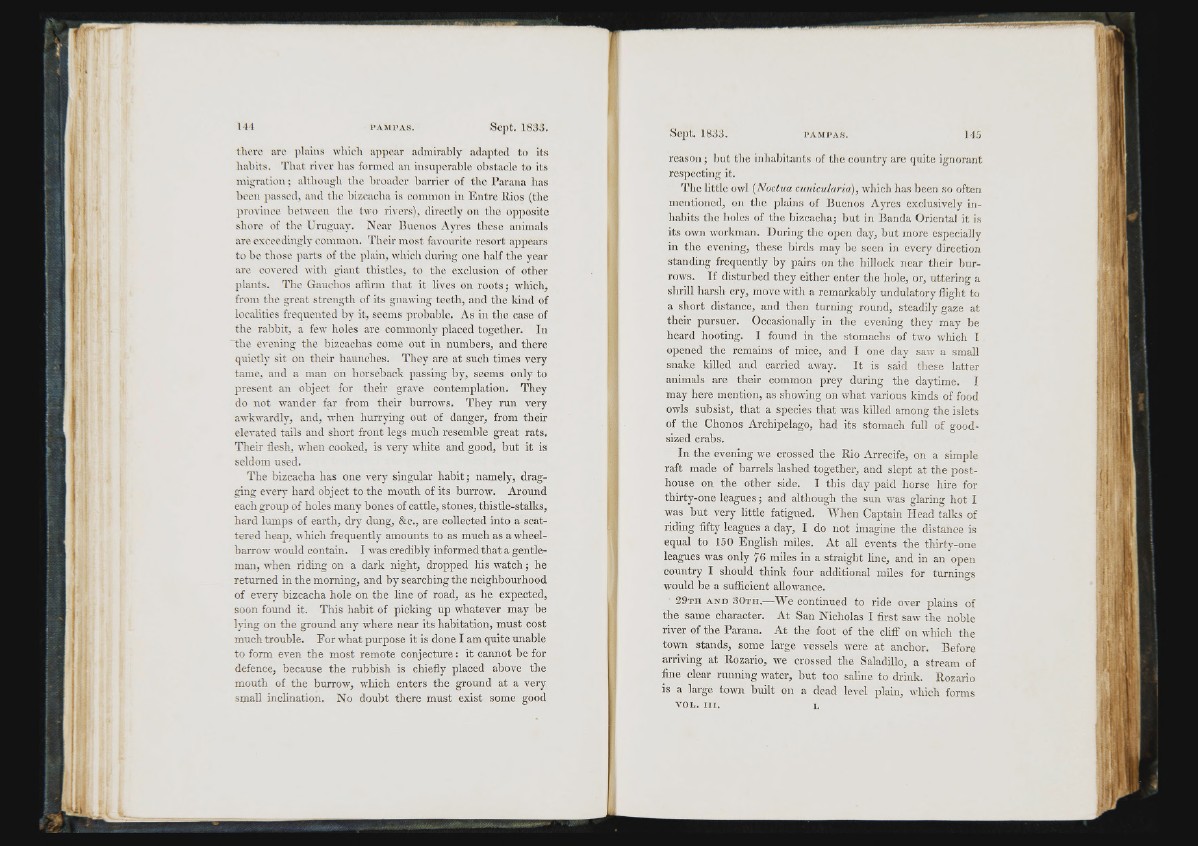
thoro arc jihuiis which apiioar adniiralily lulajitcd to its
lialhts. Tliat rivov lias f'oniiod an insupornblc obstacle to its
migration; although the broader barrier of the I’araiia has
been passed, and tho Ihzeaelta is eoininou in Kntrc Rios (the
province between the two rivers), direetlv on the opjiosite
shore of the Uruguay. Near Buenos Ayres these atiimals
are exceedingly common, 'riieirmost favourite resort appcans
to be those parts of the plain, which duriug one half the ye.ar
are covered with giant thistles, to the exclusion of other
plants. The Gauchos affirm that it lives on roots; which,
from the great strength of its gnawing teeth, and the kind of
localities frequented by it, seems probable. As in the case of
the rabbit, a few holes are commonly placed together. lu
the evening the bizcachas come out in numbers, and there
quietly sit on their haunches. They are at such times very
tame, and a man on horseback passing by, seems only to
present an object for their grave contemplation. They
do not wander far from their burrows. They run very
awkwardly, and, when hurrying out of danger, from their
elevated tails and short front legs much resemble great rats.
Their flesh, when cooked, is very white and good, but it is
seldom used.
Tlie bizcacha has one very singular habit; namely, dragging
every hard object to the mouth of its burrow. Around
each group of holes many bones of cattle, stones, thistle-stalks,
hard lumps of earth, drv dung, &c., are collected into a scattered
heap, V hich frequently amounts to as much as a wheelbarrow
would contain. I was credibly informed that a gentleman,
when riding on a dark night, dropped his watch; he
returned in the morning, and by searching the neighbourhood
of ever)- bizcacha hole on the line of road, as he expected,
soon found it. This habit of picking up whatever may be
lying on the ground any where near its habitation, must cost
much trouble. For what purpose it is done I am quite unable
to form even the most remote conjecture: it cannot he for
defence, because the rubbish is chiefly placed above the
mouth of the burrow, which enters the ground at a very
small inclination. No doubt there must exist some good
reason ; but tlie inliabitants of the country are quite ignorant
ros|)eeting it.
The little owl [Nuclua curiicularia), which has been so often
mentioned, on the jilaiiis of Buenos Ayres exclusively inhabits
the holes of the bizcacha; but in Banda Oriental it is
its own workman. During the open day, but more especially
in the evening, these birds may be seen in every direction
standing frequently by pairs on the hillock near their burrows.
If disturbed they either enter the hole, or, uttering a
shrill harsh cry, move with a remarkably undulatory flight to
a short distance, and then turning round, steadily gaze at
their pursuer. Occasionally in the evening they may be
heard hooting. I found in the stomachs of two which
opened the remains of mice, and I one day saw a small
snake killed and carried away. It is said tliese latter
animals are their common prey during the daytime. I
may here mention, as showing on what various kinds of food
owls subsist, that a species that was killed among the islets
of the Chonos Archipelago, had its stomach full of good-
sized crabs.
In the evening we crossed the Rio Arrecife, on a simple
raft made of barrels lashed together, and slept at the post-
house on the other side. I this day paid horse hire for
thirty-one leagues; and although the sun was glaring hot I
was but very little fatigued. When Captain Head talks of
riding fifty leagues a day, I do not imagine the distance is
equal to 150 English miles. At aU events the thirty-one
leagues was only 76 miles in a straight line, and in an open
country I should think four additional miles for turnings
would be a sufficient allowance.
2 9 t h a n d 3 0 t h .—W e continued to ride over plains of
the same character. At San Nicholas I first saw the noble
river of the Parana. At the foot of the cliff on which the
town stands, some large vessels were at anchor. Before
arriving at Rozario, we crossed the Saladillo, a stream of
fine clear running water, but too saline to drink. Rozario
is a large town built on a dead level plain, which forms
VOL . I I I . L
u\ I